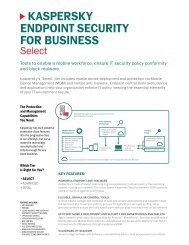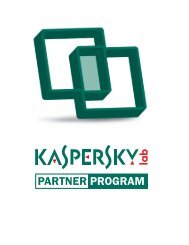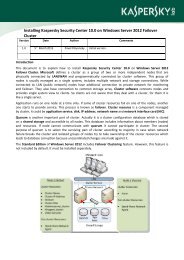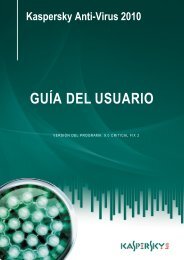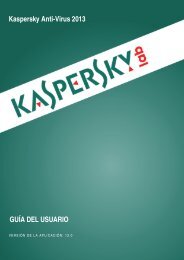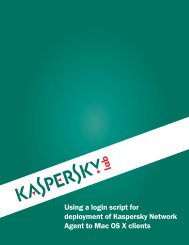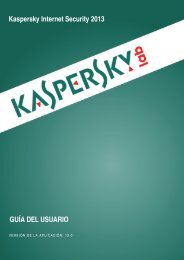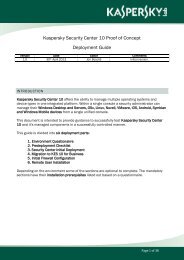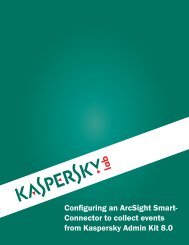Kaspersky PURE User Guide - Kaspersky Lab
Kaspersky PURE User Guide - Kaspersky Lab
Kaspersky PURE User Guide - Kaspersky Lab
Create successful ePaper yourself
Turn your PDF publications into a flip-book with our unique Google optimized e-Paper software.
I N F O R M A T I O N A B O U T T H I R D - P A R T Y C O D ESUBSTITUTE GOODS OR SERVICES; LOSS OF USE, DATA, OR PROFITS; OR BUSINESS INTERRUPTION)HOWEVER CAUSED AND ON ANY THEORY OF LIABILITY, WHETHER IN CONTRACT, STRICT LIABILITY, ORTORT (INCLUDING NEGLIGENCE OR OTHERWISE) ARISING IN ANY WAY OUT OF THE USE OF THISSOFTWARE, EVEN IF ADVISED OF THE POSSIBILITY OF SUCH DAMAGE.Code generated by the Protocol Buffer compiler is owned by the owner of the input file used when generating it. Thiscode is not standalone and requires a support library to be linked with it. This support library is itself covered by theabove license.QT 4.6.1Copyright (C) 2009, Nokia Corporation and/or its subsidiary(-ies)-----------------------------------------------------------------------------GNU LESSER GENERAL PUBLIC LICENSE v.2.1PreambleThe licenses for most software are designed to take away your freedom to share and change it. By contrast, the GNUGeneral Public Licenses are intended to guarantee your freedom to share and change free software--to make sure thesoftware is free for all its users.This license, the Lesser General Public License, applies to some specially designated software packages--typicallylibraries--of the Free Software Foundation and other authors who decide to use it. You can use it too, but we suggest youfirst think carefully about whether this license or the ordinary General Public License is the better strategy to use in anyparticular case, based on the explanations below.When we speak of free software, we are referring to freedom of use, not price. Our General Public Licenses aredesigned to make sure that you have the freedom to distribute copies of free software (and charge for this service if youwish); that you receive source code or can get it if you want it; that you can change the software and use pieces of it innew free programs; and that you are informed that you can do these things.To protect your rights, we need to make restrictions that forbid distributors to deny you these rights or to ask you tosurrender these rights. These restrictions translate to certain responsibilities for you if you distribute copies of the libraryor if you modify it.For example, if you distribute copies of the library, whether gratis or for a fee, you must give the recipients all the rightsthat we gave you. You must make sure that they, too, receive or can get the source code. If you link other code with thelibrary, you must provide complete object files to the recipients, so that they can relink them with the library after makingchanges to the library and recompiling it. And you must show them these terms so they know their rights.We protect your rights with a two-step method: (1) we copyright the library, and (2) we offer you this license, which givesyou legal permission to copy, distribute and/or modify the library.To protect each distributor, we want to make it very clear that there is no warranty for the free library. Also, if the library ismodified by someone else and passed on, the recipients should know that what they have is not the original version, sothat the original author's reputation will not be affected by problems that might be introduced by others.Finally, software patents pose a constant threat to the existence of any free program. We wish to make sure that acompany cannot effectively restrict the users of a free program by obtaining a restrictive license from a patent holder.Therefore, we insist that any patent license obtained for a version of the library must be consistent with the full freedomof use specified in this license.Most GNU software, including some libraries, is covered by the ordinary GNU General Public License. This license, theGNU Lesser General Public License, applies to certain designated libraries, and is quite different from the ordinaryGeneral Public License. We use this license for certain libraries in order to permit linking those libraries into non-freeprograms.When a program is linked with a library, whether statically or using a shared library, the combination of the two is legallyspeaking a combined work, a derivative of the original library. The ordinary General Public License therefore permitssuch linking only if the entire combination fits its criteria of freedom. The Lesser General Public License permits more laxcriteria for linking other code with the library.279



